by Jim Slama and Bob Benenson, Family Farmed
As FamilyFarmed prepared for the James Beard Foundation Awards in Chicago on May 4 — the first time the “culinary Oscars” ceremony was held outside New York City — we decided to welcome out-of-town attendees with an article providing “10 delicious facts” about the blossoming Good Food scene in our hometown.
When we were finished, we found we had created a pretty sweeping guide to Chicagoland Good Food that our readers might find valuable as a standing feature of our Good Food on Every Table website. So we are reposting the Top 10 list here, and will prominently maintain it as a “widget” in the right sidebar for some time to come.
One thing we want to make sure to note: While we have provided lots and lots of detail, we make no pretense that this is a comprehensive take on Chicago’s local food scene. That would require a book, not an article, given what an expansive reach the Good Food movement already has and how rapidly it continues to grow.
That said, we will be updating the article from time to time. In the meantime, if you believe that your company has been overlooked, please feel free to use the comments section to draw attention to what you are doing. The more information we can provide, the better!
And if you are reading this outside the Chicago area and would like to let the world know about the Good Food scene in your hometown, please contact bob@familyfarmed.org — we would be more than happy to publish your contribution.
Good Food on Every Table also published a story about how the winners of the 2015 James Beard Foundation Awards reflect the increasing recognition of the Good Food movement by the nation’s culinary leaders. To read more, click here.
Without further adieu, here are 10 reasons why we think the Chicago food scene is a very big deal.
1. Compliments to the Chefs
Chicago is a culinary capital. Chefs Rick Bayless, Paul Kahan, and Grant Achatz — who were the co-chairs of this year’s James Beard Awards — exemplify this.
Bayless’ regional Mexican restaurants are legendary for their pursuit of organic and local ingredients. Bayless was acclaimed as one of the Best Chefs in America for Topolobampo in 1991, the very first year of the James Beard Awards, and was Outstanding Chef of 1995 for that outlet and Frontera Grill. And he is still collecting JBA medallions: He, with local reporter Steve Dolinsky, won a 2015 James Beard Award for Best Podcast for “The Feed,” and Topolobampo was a finalist for this year’s Outstanding Service Award.
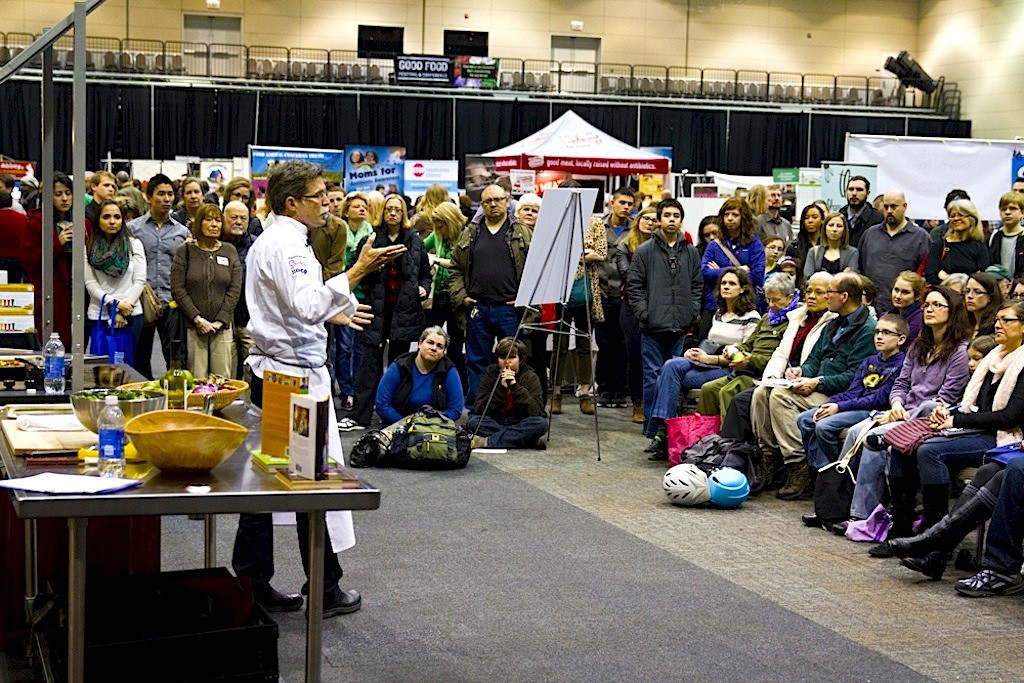
Rick Bayless conducting a chef demo at FamilyFarmed’s Good Food Festival & Conference, an annual event in which he is a frequent participant.
Kahan, Outstanding Chef of 2013 for Blackbird, is another Beard regular. Donnie Madia, his business partner in the One Off Hospitality Group, took home a James Beard medallion May 4 as the nation’s Outstanding Restaurateur of 2015. And One Off’s The Violet Hour, which helped launch the mixology trend in Chicago, was the winner in the Outstanding Bar Program category.
Achatz, won the Outstanding Chef Award in 2008, and his restaurant Alinea — which he established and runs with business partner Nick Kokonas — is frequently ranked as the best restaurant in the U.S. and one of the best in the world.
Richard Melman of the Lettuce Entertain You Enterprises restaurant group received the James Beard Lifetime Achievement Award Monday. The ceremony also was an opportunity to pay tribute to the late Charlie Trotter, who won the James Beard Outstanding Chef award in 1999 and whose Charlie Trotter’s won for outstanding restaurant in 2000.
And over the years, many Chicago chefs have won Best Chef: Great Lakes awards, including Bruce Sherman, Stephanie Izard, Dave Beran, Koren Grieveson, Tony Mantuano, Carrie Nahabedian, Jean Joho, Arun Sampathavivat, Sarah Stegner, Gabino Sotelino, Shawn McClain, and Rick Tramonto. In addition, Mindy Segal and Gale Gand have won awards for best pastry chef.
And this town is always generating great new talent. Jimmy Bannos Jr. of The Purple Pig was recognized as the Rising Star Chef of 2014. Tanya Baker of The Boarding House was one of six national finalists for that award this year, and Parachute was up for Best New Restaurant.
2. Farm to Table is King
According to the National Restaurant Association, the hottest trends in the restaurant and foodservice industry pertain to local and sustainable food. The James Beard Foundation recognized this, and with the leadership of Chef Michel Nischan and Board member Eric Kessler, created the Chefs Boot Camp for Policy and Change to foster leadership among chefs to encourage sustainable and accessible food systems. Nischan also was the recipient of the 2015 James Beard Humanitarian Award for his work to provide wider access to Good Food for lower-income Americans.
Here in Chicago, the chefs mentioned above, plus other early adopters such as Michael Altenberg and the chefs of the Green Chicago Restaurant Coalition, have been national leaders in the “farm to table” trend. Uncommon Ground, a local Good Food trendsetter, has the nation’s first federally certified rooftop farm, and recently launched Greenstar, Illinois’ first all-organic brewery.
These days it’s tough to open a new restaurant in Chicago without having a major commitment to sourcing local ingredients. As Bayless said on a recent panel in Chicago, “You don’t have to say you’re farm to table, because now that’s sort of the way we all cook.”
Chicago is home to FamilyFarmed’s annual Good Food Trade Show, the oldest and largest trade show in America that is focused on local, sustainable food. It now includes a food policy conference, public festival, and financing and innovation event. It supports more than 180 farms, food hubs, bakers, and food artisans that sell Good Food to hundreds of restaurants, retailers, and institutional buyers throughout the region.
3. Farmers Markets: Reconnecting Consumers to Food
“Know Your Farmer, Know Your Food” is a mantra in the Good Food movement (by the way, our organization defines Good Food as local, sustainable, humane, and fair), and Chicago is a great place for consumers to get to know their farmers. The community of 378 farmers markets in Illinois is the third largest number among the states. It includes 20 operated by the city of Chicago.
The city’s Green City Market is widely credited for helping kick-start the local food movement here. It limits its vendors to a 250-mile radius around the city and requires that they be certified organic, naturally grown, or animal welfare approved.
“Many of the markets throughout the state have partnered with their local chefs and restaurants to provide fresh local foods to their customers and local restaurants, especially in the Chicagoland area,” said Pat Stieren, executive director of the Illinois Farmers Market Association. “There are many markets that have standing relationships with some of the area’s top chefs and restaurants.”
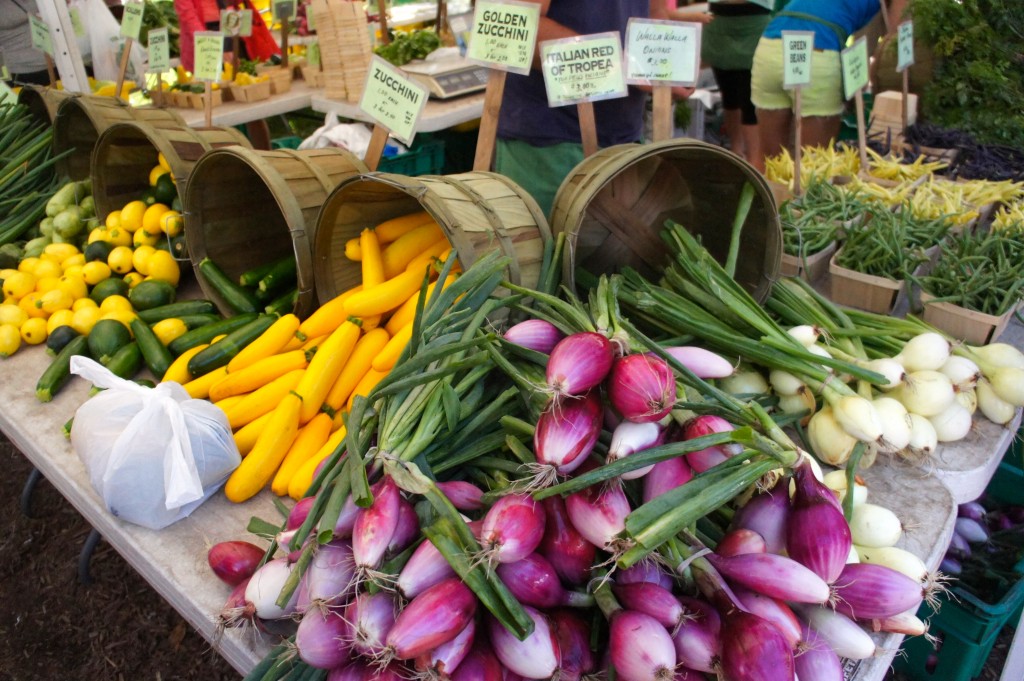
Farmers markets, such as Green City Market seen here, bring a bounty of fresh produce to consumers in Chicago. Photo by Bob Benenson.
In addition, the 61st Street Farmers Market at Chicago’s Experimental Station has been a statewide leader in developing programs to encourage recipients of SNAP assistance (which succeeded food stamps) to purchase fresh food at farmers markets. Stieren reported that more than 100 farmers markets across the state now accept SNAP Electronic Benefit Transfer payments.
4. Good Food Goes to School
FamilyFarmed partnered with Chicago Public Schools (CPS) and their foodservice provider five years ago to launch a major local sourcing program. CPS since has purchased more than $13 million in food from local farmers and is now sourcing antibiotic-free chicken from Indiana Amish farms, the largest purchase of its type in the U.S. CPS has also worked with school districts in New York City, Los Angeles, Houston, and Miami to encourage them to source antibiotic-free chicken.
FarmLogix is a digital platform that connects CPS and other schools and institutions across the country with farm producers.
Chefs Kahan, Matthias Merges, Jason Hammel, and Ryan Poli created Pilot Light, an innovative CPS program that integrates multi-faceted food-based lessons into the curriculum with math, science, social studies, and more. Purple Asparagus, a nonprofit that teaches children about healthy eating and wellness, has worked closely on projects with CPS. And the Chicago High School for Agricultural Sciences on the South Side provides unique learning opportunities for students seeking both marketable skills and college-level competencies across the farm and food spectrum.
The Kitchen Community, entrepreneur Kimball Musk’s NGO, has partnered with CPS to create more than 100 school gardens across the city. FamilyFarmed partnered with CPS on the “Eat What You Grow” program, creating a school garden food safety manual and training materials that allow CPS cafeterias to source and serve produce from their own school gardens.
The Healthy Schools Campaign works extensively with the CPS system on food-related health and wellness programs, and Seven Generations Ahead — a nonprofit organization based in suburban Oak Park that is dedicated to sustainability — was named this year by the National Farm to School Network as the lead organization for its farm to school programs in Illinois.
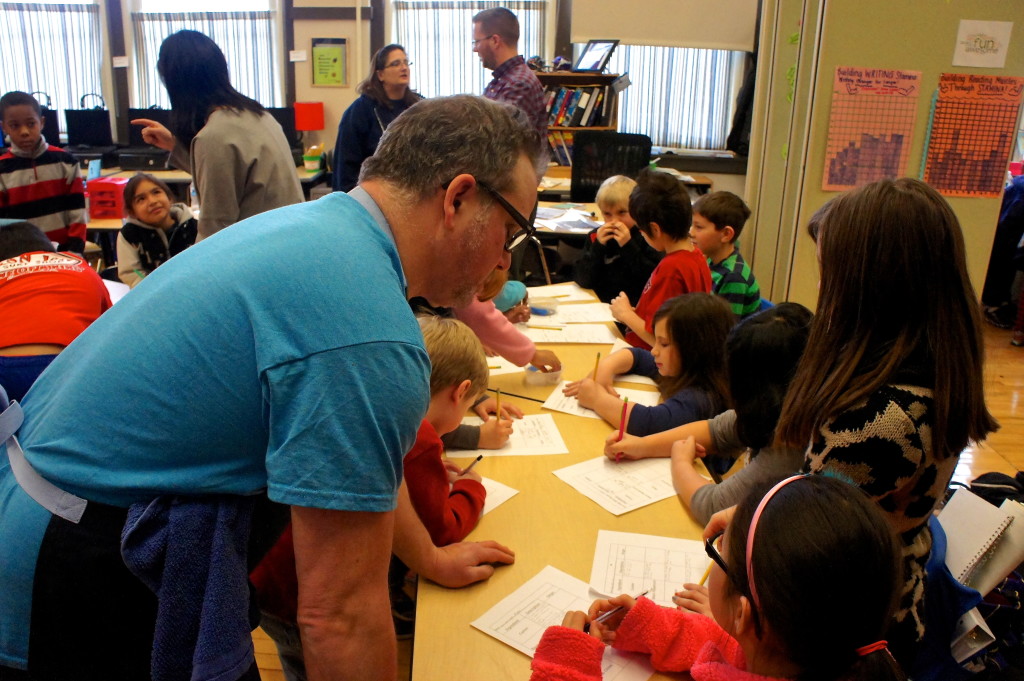
Chicago chef Paul Kahan, a co-founder of the Pilot Light program, works with third graders during a lesson on Chicago food cultures in February 2015. Photo by Bob Benenson.
5. Amber Waves of Whole-Grain Goodness
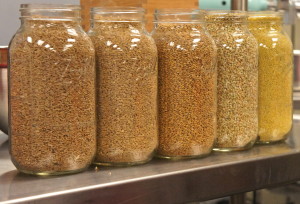
Jars of the heirloom whole grains sourced by Dave and Megan Miller at Chicago’s Baker Miller bakery/restaurant/millhouse, at their workshop on home milling at Family Farmed’s Good Food Festival March 21. Photo by Bob Benenson.
The prominence of the local and sustainable food movement in Chicago has helped it stay near the head of the curve on many new developments. Dan Barber, a James Beard awarded chef, this year won the prize for his book The Third Plate that has helped spark a burgeoning interest in heirloom and other heritage grains.
Pioneering regional producers such as Spence Farms, Hazzard Free Farm, Breslin Farms, Brian Severson Farms, and Lonesome Stone are now supplying for a Good Grain revolution in Chicago.
Chef/bakers such as Greg Wade of Kahan’s Publican Quality Bread, Paul Fehribach of Big Jones, and Dave and Megan Miller of Baker Miller, a Chicago bakery/restaurant/millhouse, are using local, heirloom, and ancient varieties of grain at a level not seen before in the region in the modern era.
Meanwhile, Barber’s Blue Hill at Stone Barns restaurant, located in suburban New York City at the Stone Barns Center for Food and Agriculture, won the 2015 James Beard Award for Restaurant of the Year.
6. Financing the Growth of Good Food
Helping food and farm entrepreneurs obtain financial resources and expand the local food market is a core mission of FamilyFarmed. Our Good Food Financing & Innovation Conference, which convenes in Chicago each March, has helped grow these food and farm businesses by connecting them with a growing community of lenders and investors. Over the past three years, participating businesses have secured more than $12.5 million in debt and equity financing, and this year’s conference showcase had more than 30 new businesses seeking capital in a juried Financing Fair.
The Good Food Business Accelerator, a spinoff of the financing conference, is now operating at 1871, Chicago’s center for entrepreneurial innovation (its name is a reference to the city’s regeneration after the Great Fire). This intensive six-month program — which completed its first class in May — works with a cohort of competitively selected farm and food entrepreneurs to help them develop business and financing plans, and connects them with large-scale buyers, angel investors, venture capitalists, or lenders.
Chicago is now home to SLoFIG and the Angel Food Network, groups with more than 40 investors seeking food deals, plus more than a dozen venture capitalists working in this space. In addition, Farm Credit and the U.S. Small Business Administration are actively engaged in the Good Food space.

The Fellows in the first cohort of FamilyFarmed’s Good Food Business Accelerator, during their Demo Day at 1871 in Chicago. First row (left to right): Alberto Rincón of The Urban Canopy, Riana Lynn of FoodTrace, Rowida Assalimy of Kishr, Jenny Yang of Phoenix Tofu, and Mark Schneider of Living Water Farms. Back row: Nik Jakobs of Jakobs Bros. Farms, Shane Christensen of dailyServing, Thomas Frierson of Spark of the Heart, and Raya Carr and Harry Carr of Mint Creek Farm. Photo by Greg Rothstein, 1871/Spot My Photos.
7. A New Wave of Young Farmers
The average age of farmers in the United States is pushing 60, which means our food system, Good or otherwise, is in trouble if we don’t start getting more young people involved in production. The Chicago area is a leader in young farmer training.
Some of this takes place outside the city as locations such the Prairie Crossing Farm Business Development Center, The Land Connection, University of Illinois, Illinois Stewardship Alliance, and the Angelic Organics Learning Center.
In recent years, Chicago has also developed an important urban growing and training sector that includes such standouts as Growing Power (founded by urban ag pioneer Will Allen), Windy City Harvest, Growing Home, The Plant, and The Urban Canopy (a Good Food Business Accelerator Fellow). The rise of urban agriculture in Chicago was greatly abetted by an amendment to the city’s zoning ordinance that was implemented in 2011.
Many young farmers, rural and urban, are getting a boost from the rise of the Community Supported Agriculture concept and the Band of Farmers network of CSAs.
And, with support of the U.S. Department of Agriculture (USDA), FamilyFarmed has trained more than 8,000 farmers nationwide with its Wholesale Success training, which teaches them post-harvest handling, packing, and food safety skills.
8. Year-Round Vegetable Production Scaling Up
Even with our great food scene here, it’s doubtful the James Beard Awards would have come to Chicago if the ceremony were held in, say, February. It gets mighty cold here, which means a short growing season. But with demand rising for year-round local food and techniques for indoor production improving, the Chicago region is stepping up to the plate in a big way.
FarmedHere in suburban Bedford Park is one of the largest indoor vertical farms in America and the only one to be certified organic. It uses an aquaponic system to grow greens in a 90,000 square foot facility. It now employs 40 people, many of whom are at-risk youth, veterans, or individuals who were formerly homeless or incarcerated.
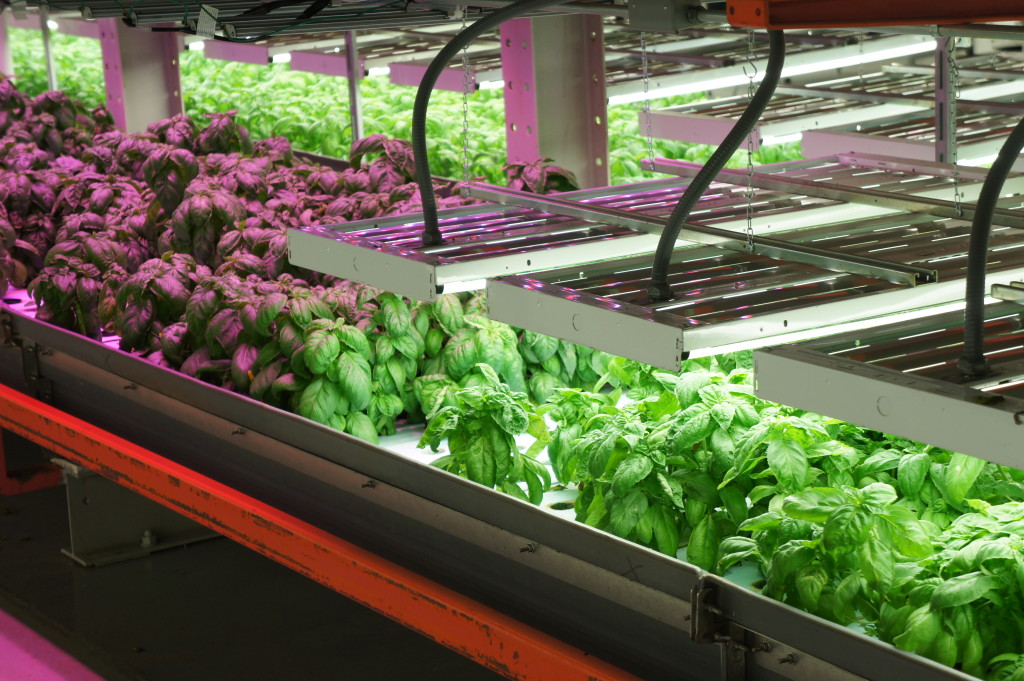
Farmed Here, located just west of Chicago’s city limits, grows prolific amounts of herbs — such as this basil — and salad greens in its year-round, indoor vertical farm. Photo by Bob Benenson.
New York-based Gotham Greens is constructing a massive greenhouse, on the rooftop of a new Method natural cleaning product manufacturing facility in the historic Pullman neighborhood of Chicago.
Living Water Farms, located in central Illinois, is graduating from the first cohort of the Good Food Business Accelerator and is seeking financing to significantly expand its greenhouse production, with Chicago as its largest market. And CG Greenhouses — whose CEO, Jim Murphy, also is chairman of Local Foods Chicago, a Good Food distributor that is building an innovative retail store in the city — plans to develop a 311,000 square foot commercial greenhouse to grow hydroponic tomatoes year-round for the Chicago market in Rochelle, about 90 miles west.
9. We Have Policy Makers’ Attention
Perhaps nothing says better that a trend has become a movement than when major public officials give it the time of day. FamilyFarmed’s 11th annual Good Food Festival & Conference March 19-21 drew a record number of attendees and top officeholders and appointees, including Dick Durbin, the state’s veteran Democratic U.S. senator; Bruce Rauner, Illinois’ new Republican governor; Cook County (Chicago) Board President Toni Preckwinkle; Jeff Malehorn, who heads World Business Chicago, the city’s lead business agency; and two federal officials whose agencies are major supporters of the Good Food Business Accelerator: Anne Alonzo of the USDA’s Agricultural Marketing Service and Marianne O’Brien Markowitz, who heads the Midwest region of the U.S. Small Business Administration.
Chicago Mayor Rahm Emanuel was a headline participant in the 2014 Good Food Festival & Conference and was on stage with Whole Foods Market co-CEO Walter Robb to announce the launch of the Good Food Business Accelerator.
In addition, FARM Illinois was funded by the Searle Funds at the Chicago Community Trust to develop a statewide plan to encourage growth in food and agriculture. And Fresh Taste, a funders’ collaborative, has played an important role in encouraging foundations and donors to provide philanthropic support for Good Food.
And, of course, there are committed activists working to change our food system for the better through organizations such as the Illinois Food, Farms & Jobs Council, Advocates for Urban Agriculture, the Chicago Food Policy Action (formerly Advisory) Council, and Good Greens.
10. Good Food is Everywhere!
The exponential growth of the Good Food movement is, of course, most evident at the retail level.
Under the leadership of Midwest President Michael Bashaw, Whole Foods Market — a longtime ally of FamilyFarmed and a lead partner in the Good Food Business Accelerator — is expanding across the Chicago region. Mariano’s, a sponsor of the 2015 James Beard Foundation Awards, is also expanding local and natural options for consumers. Other natural foods chains are establishing themselves here, conventional supermarkets are responding to demand by adding to their Good Food inventory, and the food co-operatives sector, long dormant in this region, is again on the rise.
The region’s institutional leaders are also embracing Good Food. Chicago’s McCormick Place, the largest convention center in America, is now sourcing more than 40 percent of its food from sustainable or local sources. And you can even get a great farm to table meal at O’Hare Airport — an airport! — thanks to Rick Bayless’ fast-casual Tortas Frontera.
And these buyers do not have to look far in search of great Good Food suppliers. Goodness Greeness, has been one of the few all-organic food hubs in the nation since its founding in 1991, and it is has sustained jobs and opportunity in Englewood, a community on Chicago’s South Side that has dealt with overall economic decline.
So if you are out for Good Food, Chicago is the right place to be.
Jim Slama is president of FamilyFarmed. Bob Benenson, a veteran journalist, is FamilyFarmed’s communications specialist.
